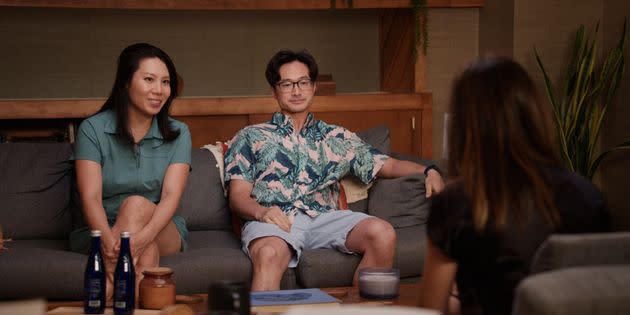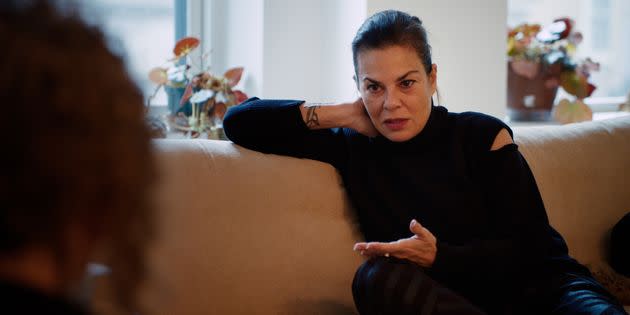What Dr. Orna Guralnik Has Learned From 4 Seasons Of ‘Couples Therapy’

Before my interview with Dr. Orna Guralnik, I was a little more nervous than usual. Throughout the four seasons of the Showtime docuseries “Couples Therapy,” Guralnik — or simply Orna, as she is known to the show’s participants — has a commanding and authoritative presence. Each season follows Guralnik, a New York-based psychoanalyst, and several couples over a series of sessions. As the couples, who come from a wide range of backgrounds, work through impasses in their relationships, they uncover wrenching pasts and arrive at deep emotional truths. But for many viewers, the most captivating part of the show is Guralnik’s seemingly unflappable demeanor.
Like on the show, whose new season begins streaming Friday on Paramount+ with Showtime and will air Sundays on Showtime, Guralnik spoke in a measured way during our Zoom interview, pausing to consider each response and whether she had given a complete answer. It was a good reminder to myself — and maybe all of us — to slow down and take a beat, instead of launching right into the next question or comment.
That measured, deliberate process exemplifies what Guralnik sees as the appeal and value of the show. Each season, she and the couples typically meet in weekly hour-long sessions for 15 to 20 weeks, which the show’s editors compress into nine half-hour episodes. We only get a sliver of the many hours of work Guralnik and the couples are doing, but there’s a depth and richness to each episode, and emotional arcs that don’t feel manufactured for the camera.
“Even though it’s obviously edited down from a longer session, we take our time. When you work as a psychoanalyst with your patients, you take your time. Nothing can be rushed. So there’s a certain kind of leaning into the practice of slowness, as opposed to instant gratification,” Guralnik told me. “On some level, we all know that we need something a lot slower to be able to process what’s going on.”
The deliberate pace also allows for “leaving some room for uncertainty — both my own and my patients’, like opening up a realm of being that is not about quick answers, not about simplistic answers, which then allows room for complexity, which is so what we need nowadays,” she continued. “I mean, everything is getting so flattened into this ‘good, bad, us, them’ — like, we’ve lost our capacity to think, and the show is a really good antidote to that. To really work through a couple’s struggle, you have to be able to think in a complex way, to entertain multiple perspectives. And the show is inviting us to do that, in the way I work and the way it’s edited.”
Season 4 of “Couples Therapy” presents some new challenges for Guralnik. For the first time on the show, there’s a polyamorous throuple, Josh, Lorena and Aryn, who are working through boundaries and communication issues. With another couple, Joey and Rex, a central tension in their marriage is Joey’s conservative religious background, which is also new territory for the series. And in the case of Casimar and Alexes, who are working through some particularly painful childhood traumas, Guralnik makes the unusual decision to work with them longer than the allotted 20 weeks on the show.

But for Guralnik, “every couple, every participant — and in my practice, every patient — in a way is a new story and a new challenge.” In shaping the latest batch of episodes, she said, she and the production team thought of it as “a more theoretical season,” trying to expand upon and disseminate the theory behind the work of psychoanalysis.
For instance, that meant “more emphasizing how early history shapes experiences now for people, and how becoming aware of unconscious motivation can really release individuals and couples from the grip of whether it’s trauma or defense mechanisms or early attachment styles — the benefit of making the unconscious conscious,” she said.
How the past shapes the present is the focus of many of Guralnik’s sessions with the couples. As adults, we often unwittingly repeat the patterns we saw from our parents or other figures in our early lives, replicating them in our own relationships. Later in the season, as she begins to wrap up her work with each of the couples, the focus turns to “What would Orna do?” She tries to equip them with the tools to work through issues on their own, preparing them for when she effectively releases them back into the world.
Behind the scenes, Guralnik said she has “a great amount of input” at various stages of the show. After each session is filmed, she has “profound conversations” with the show’s team about “the arc of the treatment and how the editors and directors are understanding the arc of the treatment.”
“I am sharing with them my thought process [about] where I think the treatment is going. People have questions that help me think through the process. Sometimes people remember things that happened that help me think about what’s going on,” she said. “So in that sense, in terms of developing a deep narrative about how the treatment is progressing and what the issues are, it’s very much my work, but it’s also, I’m held with a very wise team.”
Once the show’s editors assemble a rough cut of the episodes, she watches them with a particular eye toward whether each installment is accurately capturing the arc of the sessions.
“If I feel like something was missing or overemphasized, we talk about it. But most of the time, honestly, I watch the rough cut, and every season I’m blown away by their work,” she said. “They really manage to capture the essence of what happened in the session. That is what’s stunning to me. It’s really magic.”

Before the show’s first season in 2019, when the producers were looking for therapists to participate, Guralnik initially signed on as a consultant. She was hesitant to be on camera, which would effectively mean becoming the face of the show. Four seasons later, she said, “generally, I feel really happy that I decided to do it.”
“I feel proud of what we’ve given the world. I feel like we’ve made a real contribution,” Guralnik said. She also deeply appreciates her collaboration with the filmmaking team, who are “seriously the best people on earth,” she said. “I feel so lucky to be working with them. That’s been the biggest gift.”
At the same time, she said it’s been challenging to become a public figure, and to balance the show — which typically films two or two and a half days per week — alongside her teaching career and her clients in private practice. She now works pretty much nonstop.
“It’s been hard. It’s been an enormous amount of work. I’ve had to adjust to being a public person, which is not in my nature,” Guralnik said. “My actual patients in my private practice have suffered from this, kind of sharing me in this way. So it’s not been without a price. But overall, it’s been a really, really good experience.”
One key difference between her work on the show and her work with her clients in private practice is the time constraint. Typically, she works with couples for a wide range of time, sometimes for years, depending on what issues they’re working on. While the shorter-term work on “Couples Therapy” presents rewarding challenges for her, she said she always wishes she had more time with the couples who appear on the show.
But Guralnik also feels the show has strengthened her work overall. “It’s certainly sharpened my perspective a lot, because I have to talk about my work all the time with the directors and editors. So I’m constantly thinking about what I’m doing — and teaching it, in a way,” she said. “So that has been really good for my work, both as a clinician and as a teacher.”

Among the most captivating parts of “Couples Therapy” is the way we get a window into Guralnik’s own process and vulnerabilities. In each episode, the couples’ sessions are interspersed with scenes of Guralnik talking with her mentor, Dr. Virginia Goldner. There are also scenes with her and a peer advisory group composed of fellow therapists, often from different cultural backgrounds, helping Guralnik consider new perspectives, approaches or cultural context she may have overlooked. In many of these moments, we see Guralnik struggling with whether she’s reaching the couples in the right way, and admitting when she’s not sure what she’s doing — a reminder that she’s human too.
“I think part of what we’re trying to do with the series is to articulate to the public what is therapy and what’s a therapeutic journey, and in a way, to demystify it and have people understand that a therapist, a psychoanalyst, we go through very, very, very long trainings,” Guralnik said. “It’s decades of training. There’s a lot of theory, there’s a lot of thought, there’s a lot of constant self-observation going on, and it’s a practice of inquiry.”
“By demonstrating that through myself and what I put into it and how I question myself, I’m mimicking what we’re asking patients to do, which is to always open up for more information to question, to avoid rushing into certainty and make room for more understanding of unconscious processes,” she said. “It’s a parallel process to what the therapist puts themselves through all the time.”
In other words, even the people we consider authority figures, whether on the screen or in our day-to-day lives, don’t know all the answers.
“No, I don’t,” she said. “That’s the whole point, which is: We’re demonstrating a method of exploration, not an end result.”
Season 4 of “Couples Therapy” premieres Friday on Paramount+ with Showtime, and airs Sundays on Showtime.

